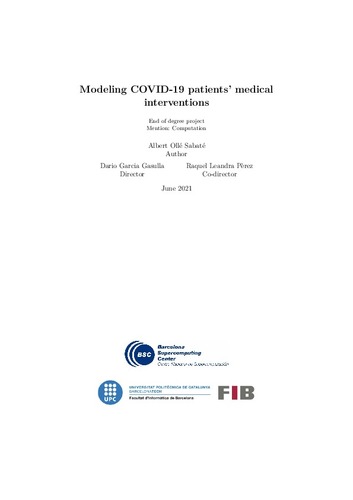Modeling COVID patients' medical interventions

Visualitza/Obre
Estadístiques de LA Referencia / Recolecta
Inclou dades d'ús des de 2022
Cita com:
hdl:2117/356172
Tipus de documentTreball Final de Grau
Data2021-06-29
Condicions d'accésAccés obert
Tots els drets reservats. Aquesta obra està protegida pels drets de propietat intel·lectual i
industrial corresponents. Sense perjudici de les exempcions legals existents, queda prohibida la seva
reproducció, distribució, comunicació pública o transformació sense l'autorització del titular dels drets
Abstract
En aquest projecte de fi de carrera, vam realitzar un estudi en pacients de UCIs espanyoles amb COVID 19 amb l'objectiu de descriure els pacients que necessitaven una ventilació mecànica invasiva i entrenem una varietat de models d'aprenentatge automàtic per veure quina obtenia les millors puntuacions. Vem dividir aquest estudi en dos subestudis, el primer va utilitzar totes les variables disponibles per a realitzar les prediccions i es va explorar en dos esdeveniments de l'estada hospitalària del pacient: L'ingrés a l'hospital i l'ingrés a l'UCI. El segon subestudi es va centrar en la predicció del mateix procediment mèdic però utilitzant només les variables que podien ser conegudes / obtingudes pel propi pacient o per algú proper. En el primer subestudi, el millor model obtingut per a l'ingrés a l'hospital va ser un bosc aleatori amb una precisió equilibrada de 0,66 i una puntuació f1 ponderada de 0,67. En l'ingrés a l'UCI, el millor model va ser també un bosc aleatori amb una precisió equilibrada de 0,78 i una puntuació f1 ponderada de 0,77. Per al segon subestudi, al posar més èmfasi en la interpretabilitat, entrenem un classificador d'arbre de decisió a partir de les característiques amb més importància segons el bosc aleatori per crear unes pautes comprensibles. Aquest arbre va obtenir una precisió equilibrada i una puntuació F1 ponderada de 0,66. In this end of degree project, we performed a study on patients from Spanish ICUs with COVID 19 with the objective to describe the patients who needed an invasive mechanical ventilation and trained a variety of machine learning models to see which would get the best scores. We divided this study into two sub studies, the first one used all the variables available to make the predictions and it was explored at two events of the patient's hospital stay: Hospital admission and ICU admission. The second sub study focused on predicting the same medical procedure but using only variables which could be known/obtained by the patient themselves or by someone close. For the first sub study at hospital admission the best model we obtained was a random forest with a balanced accuracy of 0.66 and a weighted f1-score of 0.67. At ICU admission the best model was also a random forest with a balanced accuracy of 0.78 and a weighted f1-score of 0.77. For the second sub study, as we put more emphasis on interpretability, we trained a decision tree classifier from the features with the highest importance according to the random forest in order to create understandable guidelines. This tree obtained a balanced accuracy and weighted F1-score of 0.66. En este proyecto de fin de carrera, realizamos un estudio en pacientes de UCIs españolas con COVID 19 con el objetivo de describir los pacientes que necesitaban una ventilación mecánica invasiva y entrenamos una variedad de modelos de aprendizaje automático para ver cuál obtenía las mejores puntuaciones. Dividimos este estudio en dos subestudios, el primero utilizó todas las variables disponibles para realizar las predicciones y se exploró en dos eventos de la estancia hospitalaria del paciente: El ingreso en el hospital y el ingreso en la UCI. El segundo subestudio se centró en la predicción del mismo procedimiento médico pero utilizando sólo las variables que podían ser conocidas/obtenidas por el propio paciente o por alguien cercano. En el primer subestudio, el mejor modelo obtenido para el ingreso en el hospital fue un bosque aleatorio con una precisión equilibrada de 0,66 y una puntuación f1 ponderada de 0,67. En el ingreso en la UCI, el mejor modelo fue también un bosque aleatorio con una precisión equilibrada de 0,78 y una puntuación f1 ponderada de 0,77. Para el segundo subestudio, al poner más énfasis en la interpretabilidad, entrenamos un clasificador de árbol de decisión a partir de las características con mayor importancia según el bosque aleatorio para crear pautas comprensibles. Este árbol obtuvo una precisión equilibrada y una puntuación F1 ponderada de 0,66.
MatèriesMachine learning, Neural networks (Computer science), COVID-19 (Disease), Aprenentatge automàtic, Xarxes neuronals (Informàtica), COVID-19 (Malaltia)
TitulacióGRAU EN ENGINYERIA INFORMÀTICA (Pla 2010)
| Fitxers | Descripció | Mida | Format | Visualitza |
|---|---|---|---|---|
| 160671.pdf | 2,054Mb | Visualitza/Obre |

